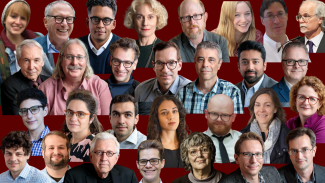
The Department of Philosophy at the University of Chicago is distinctive in combining a humanistic orientation with a commitment to philosophical rigor. We value clarity of expression and logical precision, and we believe that philosophical work is enriched when it is animated by a range of conversations in the humanities, social sciences, physical sciences, and arts. We offer exceptionally broad and deep programs in Western philosophy at the undergraduate and graduate levels in a lively, congenial, and intellectually stimulating atmosphere.
At Chicago, the philosophical community brings together in respectful and engaged dialogue groups that often stand apart from one another: first, those who are concerned with the systematic study of issues in contemporary philosophy and those who are concerned with the interpretation of classic historical texts; second, specialists in theoretical philosophy (metaphysics, epistemology, philosophy of language, philosophy of science, etc.) and practical philosophy (moral philosophy, political philosophy, etc.); and third, those who take their problems, methods, and overall orientation from the analytic tradition and those who take theirs from the continental tradition. As a result, students here need not choose sides or limit themselves to one approach or tradition. Many of our faculty already bridge one or more of these divisions in their own interests and work, and we aim to nurture a similar intellectual openness in our undergraduate and graduate students.
In addition to taking an ecumenical approach within the discipline of philosophy, philosophy at Chicago is also distinctive in its openness to serious engagement with other disciplines. Indeed, interdisciplinarity is something of a prized hallmark of this university. Many of our faculty are in long-standing research and teaching collaborations with faculty in other departments, such as Cinema and Media Studies, Classics, Germanic Studies, Law, Linguistics, Political Science, and Psychology, as well as intentionally interdisciplinary groups such as the Committee on Social Thought, the Committee on Conceptual and Historical Studies of Science, and the MacLean Center for Medical Ethics. We encourage students to take courses in other fields and, indeed, to have specialists in allied disciplines on their dissertation committees where that would be helpful. Our courses often attract students from other disciplines, and we run numerous workshops, joint programs, and conferences with faculty and students from other departments. Such institutionally fostered cross-fertilization significantly enriches the research and collegial environment for faculty and students alike.
At present the department does not offer many courses in non-Western philosophical traditions. However, the University of Chicago is fortunate to have exceptional scholars of Buddhist, Indian, and Islamic thought in its departments of South Asian Languages and Civilizations and Near Eastern Languages and Civilizations, and in its Divinity School, and we welcome our students’ studies in those areas.
